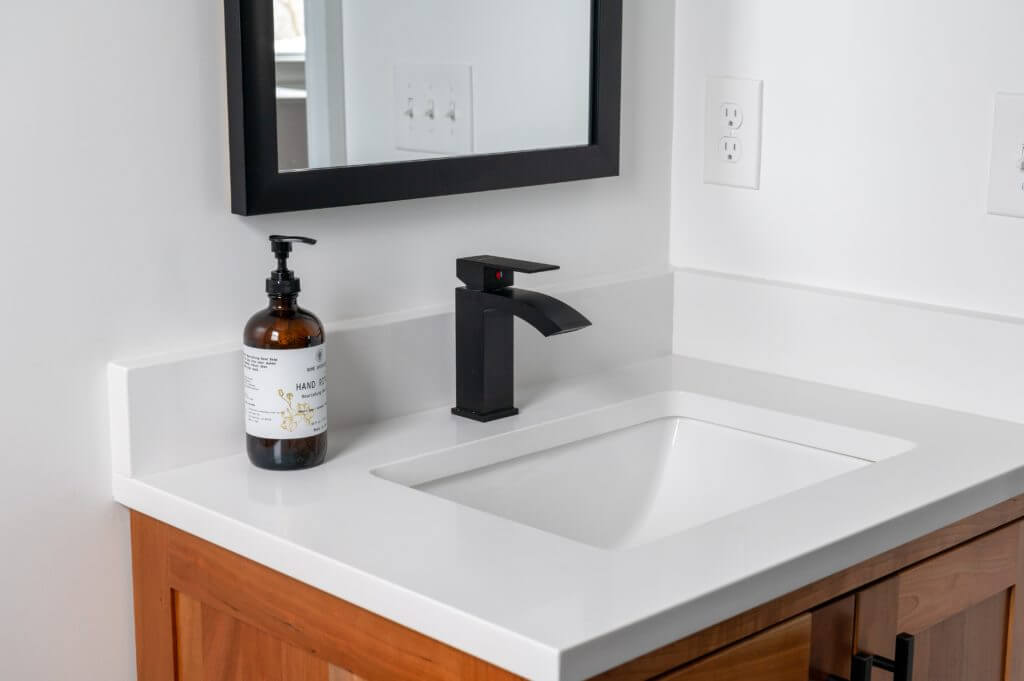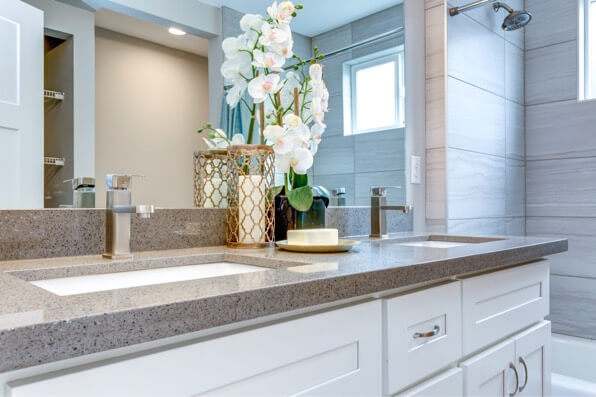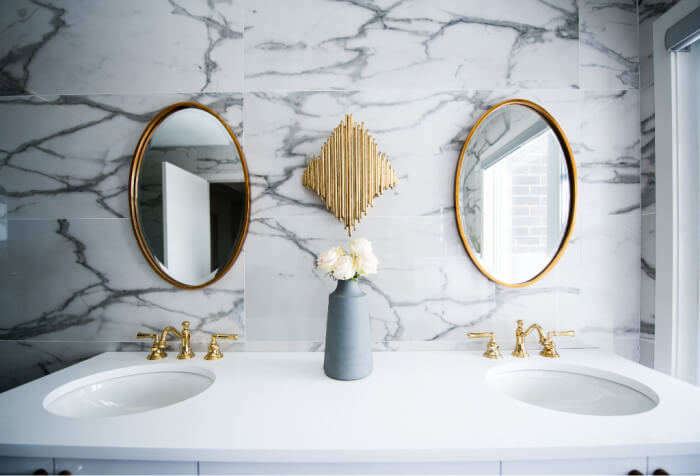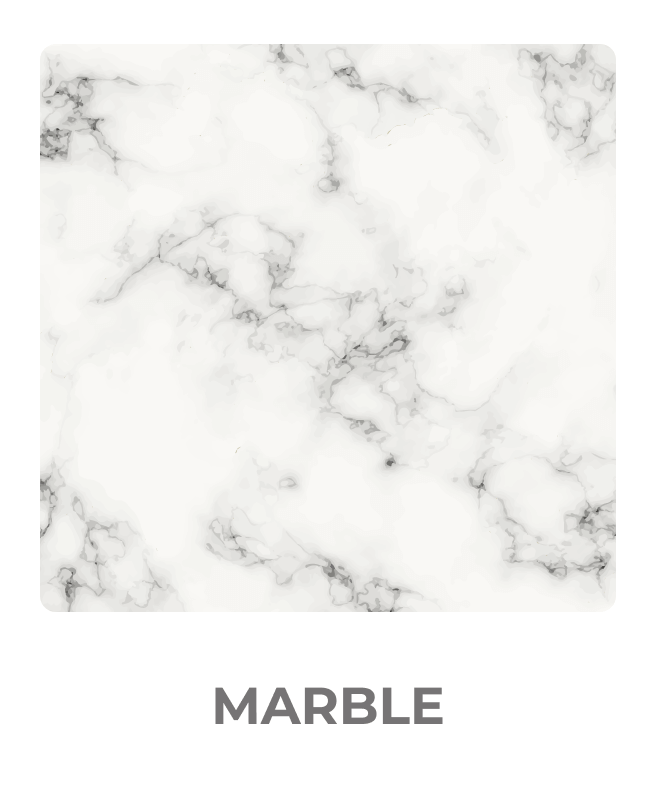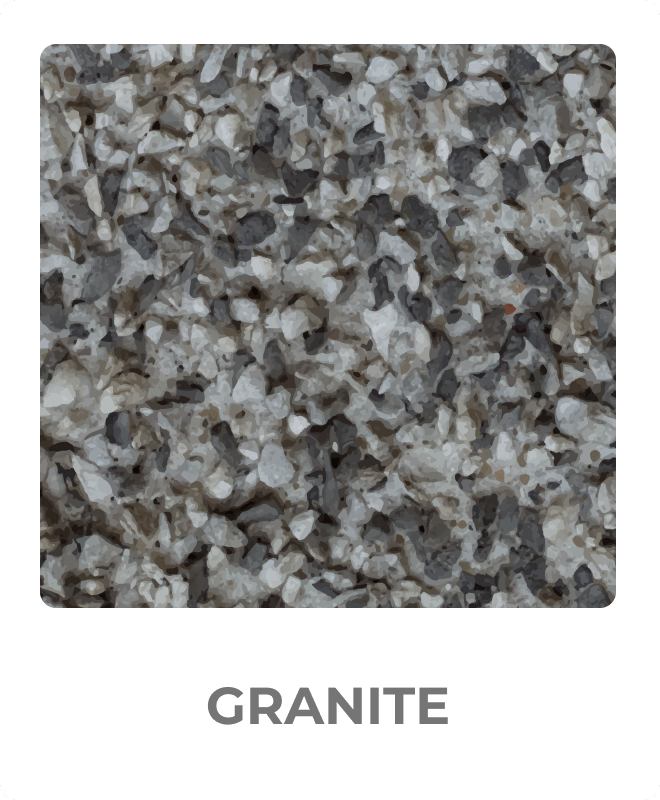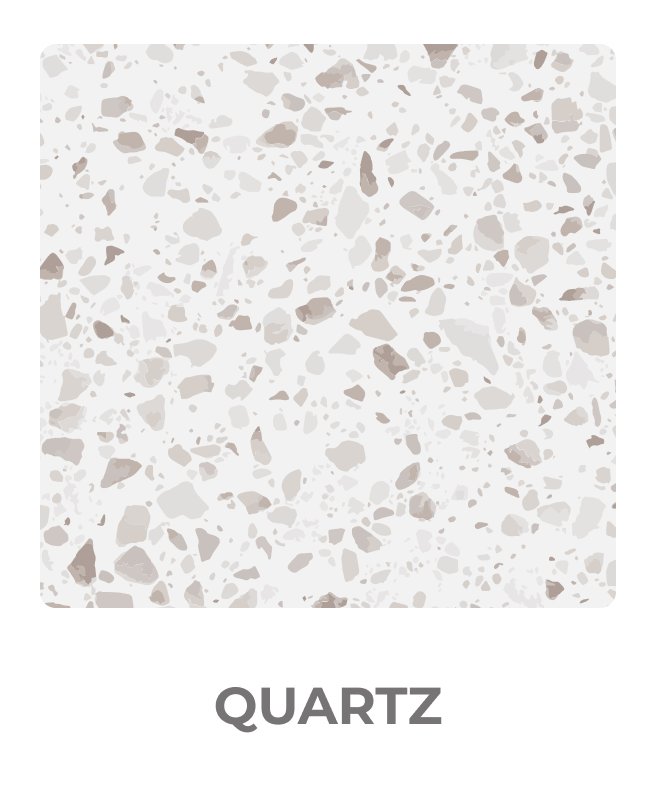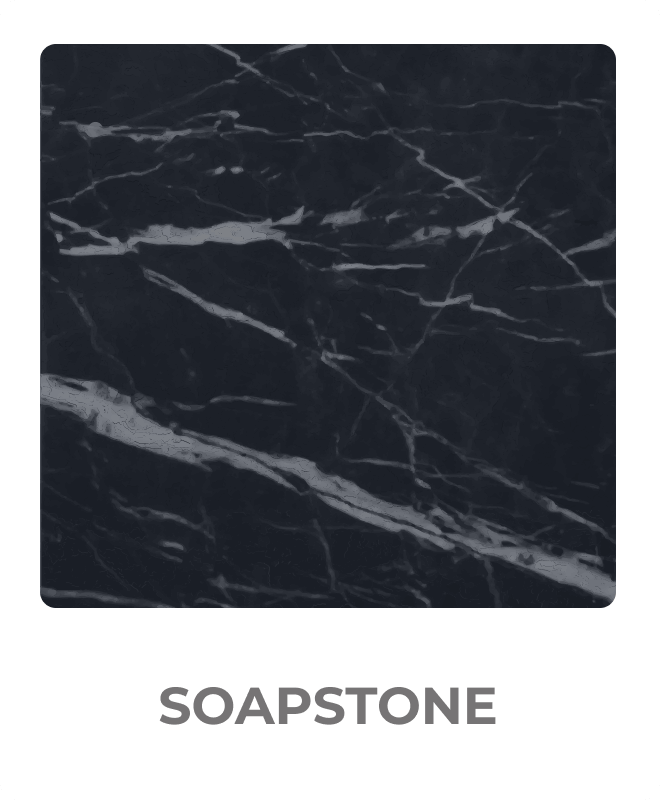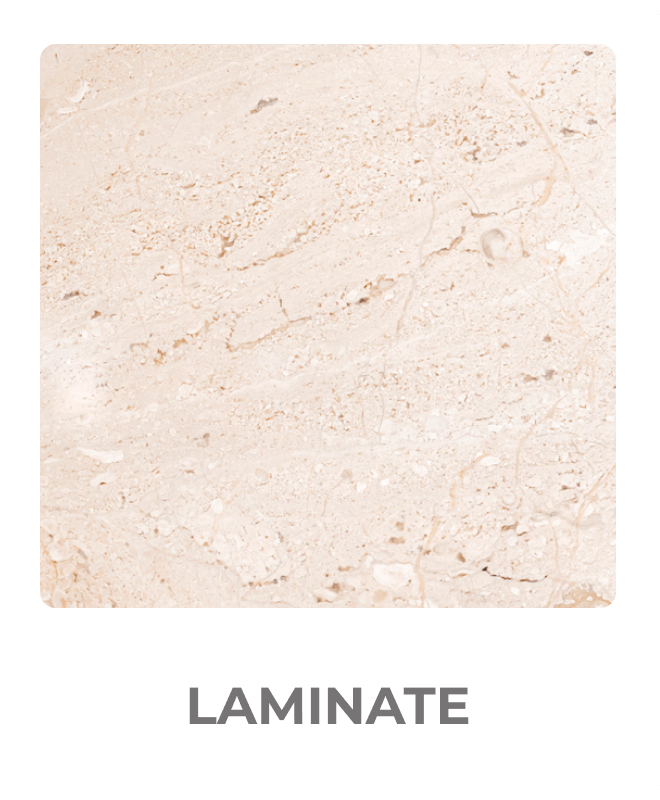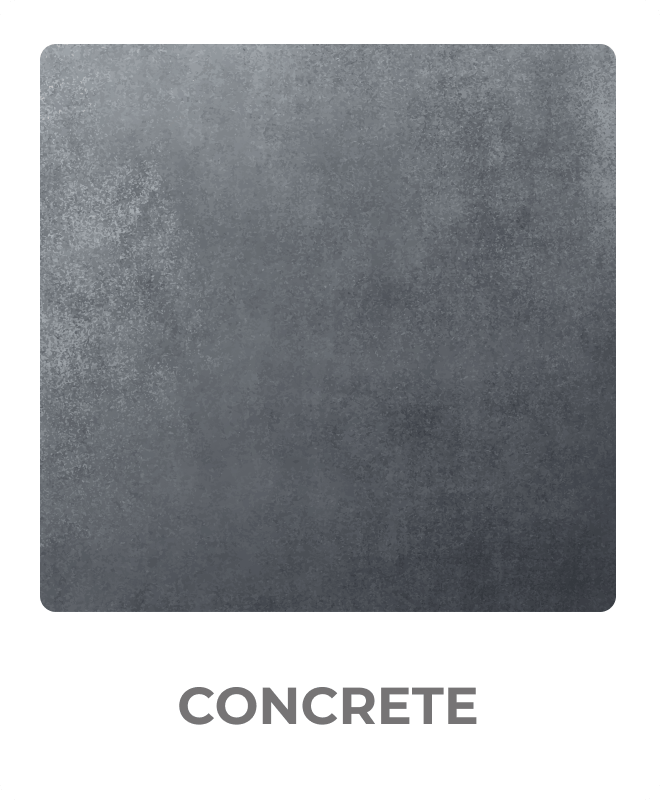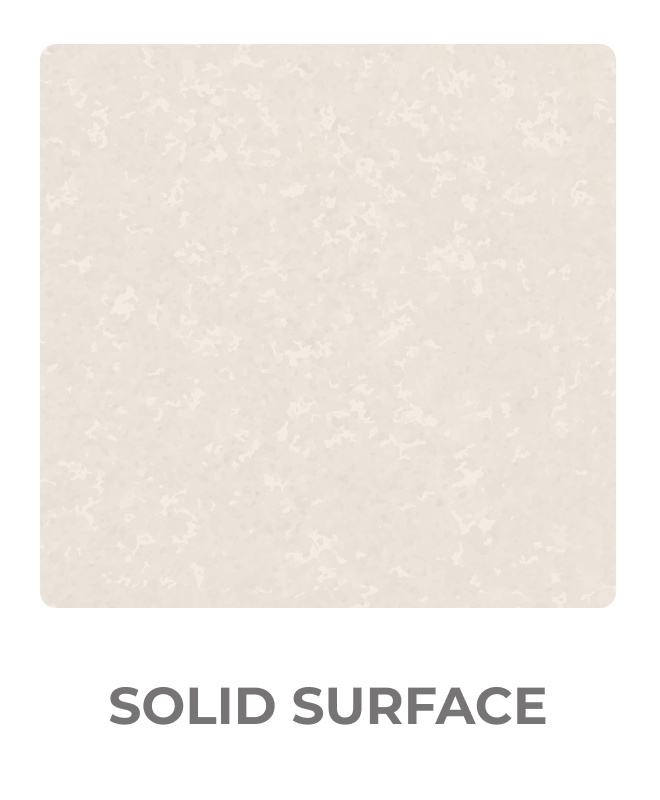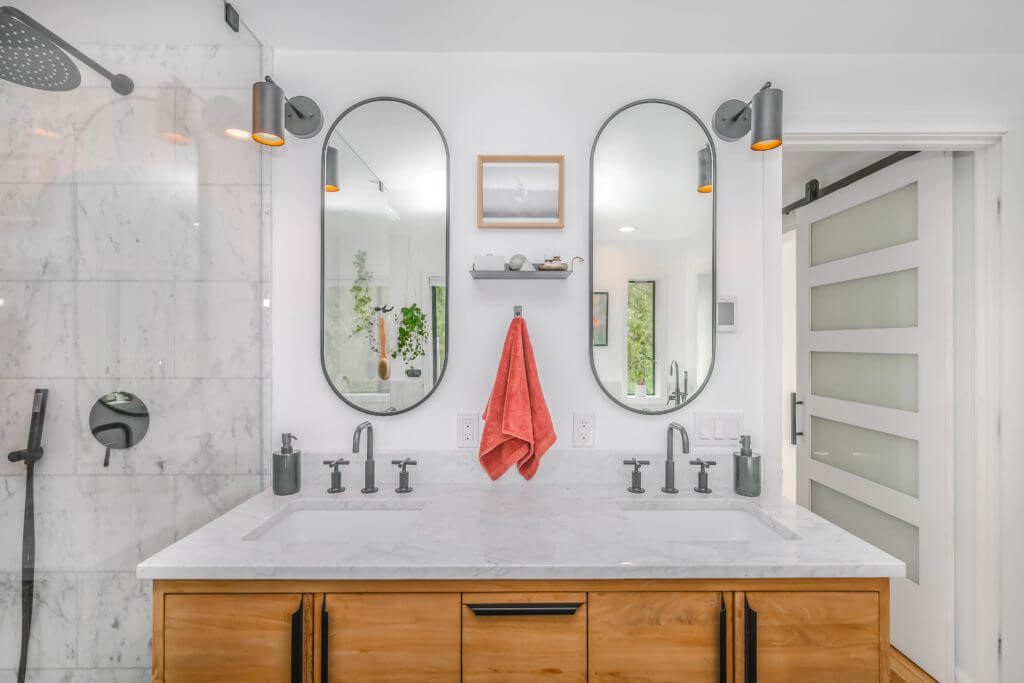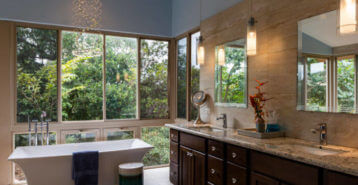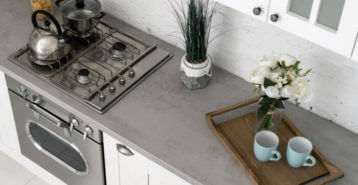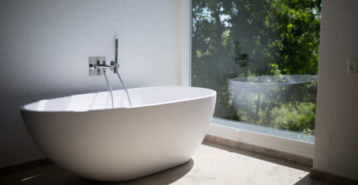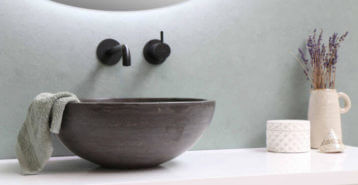Replacing bathroom countertops is one of the most popular remodel trends in the U.S. in 2025 for homeowners seeking to modernize outdated materials. Popular replacement countertop materials for a vanity or custom cabinets include granite, marble, engineered quartz and even budget-friendly surfaces like laminate. Depending on your bathroom’s size and the layout of your bathroom’s cabinets, you may only need countertops for around bathroom sinks, or you may need bathroom countertops throughout the space. These materials can not only enhance your bathroom’s functionality and visual appeal, but they also provide excellent return on investment if you ever sell your home.
Modernize created this guide to help homeowners better understand their options when it comes to replacement bathroom countertops for vanities or custom built-in cabinets.
We cover the most popular countertop materials, their costs, and pros and cons of each.
How Much Does it Cost to Replace Bathroom Countertops?
You will find that bathroom countertops prices are by the square foot. The cost to install new countertops in the bathroom can range anywhere from as low as $2 per square foot for basic tile, to $250 or more per square foot for high-end natural stone. The average cost for countertop materials in the U.S. is $81 to $148 per square foot, and the average project cost is $111 to $204 for professional installation per square foot.
How Many Square Feet of Countertop Do You Need?
The dimensions of a standard bathroom vanity can be anywhere from 18 inches to 72 inches wide by 17 inches to 24 inches deep.
- Single bathroom vanities with one sink are typically 24″ to 48″.
- Double vanities with two sinks are typically 60″ to 72″.
- The standard depth of a bathroom vanity is 20″, but can range between 17″ and 24″ deep.
Considering these dimensions, most bathrooms will require 2 to 12 square feet of countertop material. The average bathroom vanity or cabinets require 6 square feet of countertops.
Because countertop installation costs can vary so widely, it is important that you speak to a local professional and ask for a quote for the project. A professional will be able to take measurements, determine the square footage you need, and recommend materials based on your remodeling budget.
Do Your Bathroom Countertops Need to be Replaced?
Unless you are building a new home, your bathroom probably already has countertops. But you’ll likely want to replace them for the following reasons:
- You purchased a new bathroom vanity and it has different dimensions.
- Your old countertops are cracked, dingy, discolored or look shabby due to age and overuse.
- It’s time to modernize the space.
- You want new color schemes and bathroom décor.
Modernizing your bathroom can include upgrading from low-end laminate or Formica countertops, or eliminating dated tile countertops with their awful-looking discolored grout lines.
Age is another deciding factor. Old countertops often show signs of water damage, stains and blemishes that detract from the visual appeal of your bathroom. Some minor flaws and damage, such as dried out caulking or hard water stains, can be addressed with a little elbow grease. But if you are remodeling the majority of your bathroom, now is probably the time to spring for new countertops.
9 Best Countertops for Bathrooms
In this section we’ll cover the most popular materials for bathroom countertops, as well as highlight their advantages and potential drawbacks. Compare these types of countertops to make a more confident decision about your bathroom countertop project.
Marble Countertops
Marble has been used as a building material for thousands of years. New marble bathroom countertops provide timeless elegance to any bathroom and remain a popular choice for residential bathroom remodelers.
Why Choose Marble Bathroom Countertops?
Marble presents the best of both worlds when it comes to installing new countertops in the bathroom. It comes in beautiful colors that often mesh well with bathroom décor, and they can last an upwards of 100 years when maintained properly.
However, marble countertops aren’t quite as hard as granite countertops, making them more prone to etching and staining. They also can require more work to maintain than other countertop materials. You will have to reseal the countertop annually or every few years at a minimum depending on usage.
How Much Do Marble Counters Cost?
Marble can be quite expensive, costing anywhere from $107 for common marble to $196 per square foot for more expensive travertine marble.
Granite Bathroom Countertops
The inherent qualities and natural beauty of granite make it an extremely popular choice for bathroom countertops specifically. Its resilience and unique appearance cater well to the demands of high-use areas like bathrooms, where both durability and aesthetic appeal are key considerations. Granite bathroom countertops, with their distinct patterns and robust composition, provide a blend of practicality and elegance that is especially suited for these spaces.
Why Choose Granite Bathroom Countertops?
Granite is a beautiful material that can stand up to even the heaviest use in a bathroom. Water and moisture is no match for granite.
Keep in mind that granite countertops are extremely heavy, so they can cost a lot to transport. That weight also makes it more difficult to install, which could increase its cost over other countertop materials. Make sure to seal it every few years to prevent staining, especially with lighter-colored stone slabs.
How Much Do Granite Counters Cost?
Granite countertops can cost anywhere from $181 to $332 per square foot depending on size, your location, how far the slab needs to be transported, and difficulty of installation.
Quartz Bathroom Countertops
Quartz bathroom countertops are growing in popularity due to their cost versus other types of natural stone. There are also many benefits associated with this type of natural stone countertop.
Why Choose Quartz Bathroom Countertops?
Quartz is both durable and budget-friendly. This allows homeowners with more moderate bathroom remodel budgets to bring natural stone into their home. It comes in plenty of beautiful natural colors – including shades of white – which goes well with bathroom aesthetics.
Quartz is considered an engineered stone, even though the majority of the stone is from natural sources. It is not as resistant to heat as granite. But it should still hold up well in the bathroom for almost 100 years.
How Much Do Quartz Counters Cost?
These bathroom countertops can range in price from $50 to $150 a square foot. Since it is an engineered stone, higher-end quartz bathroom countertops typically have greater durability, quality and visual appeal.
Soapstone Countertops
Soapstone bathroom countertops are not as common as other types of natural stone, but they definitely can have a place in a modern bathroom remodel. This type of stone can be a bit more plain-looking than the dramatic swirls, whorls and crystals that make granite so stunning. But this simplicity can be appealing depending on your taste and style.
Why Choose Soapstone Bathroom Countertops?
Soapstone countertops often come in beautiful dark shades of gray, black, or even green and blue – often with white veins running through. This non-porous material is easy to clean and resistant to staining.
Still, soapstone doesn’t have the wide range of colors that you might find in other countertop options. Lighter-colored soapstone may stain if it comes into extended contact with oily substances. Although soapstone is hard, it doesn’t have the same scratch resistance as other countertop materials.
How Much Do Soapstone Counters Cost?
Soapstone can cost between $85 and $150 per square foot to install depending on the complexity of the installation, size of your countertop, and the place where the stone was quarried.
Tile Countertops
Tile has long been a preferred bathroom material. It is often used throughout the bathroom – for floors, countertops, backsplashes, and shower walls. But it definitely has some pros and cons that must be carefully weighed.
Why Choose Tile Bathroom Countertops?
Tile is probably the most versatile countertop material on the market. You can opt for a simple solid-colored tile countertop or create dramatic patterns, designs and finishes. Different types of tile also have different levels of durability, and therefore different costs. Also, if a tile happens to break, chip or crack, it’s pretty easy to fix it.
Tile itself is easy to clean. Grout lines, on the other hand, easily stain, and they can be quite difficult to clean. Grout also is porous, so it wants to absorb spilled liquids. You’ll want to seal tile grout lines often to prevent discoloration.
How Much Do Tile Counters Cost?
Expect to pay between $2 and $30 per square foot for tile countertops, depending on the type of tile you choose.
Laminate Countertops
Laminate is becoming a very popular go-to countertop option for homeowners looking to remodel their bathrooms. This material is made by alternating layers of kraft paper and plastic resins over a solid backing layer, But don’t confuse today’s laminate countertops with those awful looking Formica countertops that were in your first apartment.
Why Choose Laminate Bathroom Countertops?
Laminate has seen a lot of technological advances in recent years. Today’s high-pressure laminate countertops accurately mimic the look of natural stone such as granite, marble and other more-expensive countertop materials.
One advantage of laminate countertops is that they are low maintenance, and you do not have to routinely seal them. However, laminate is much less durable than stone, and it offers very minor resale value compared to other countertop options.
How Much Do Laminate Counters Cost?
Expect to pay anywhere from $46 to $84 a square foot for laminate countertops. Installation costs are generally less than other materials, though, because laminate countertops tend to be much simpler to install.
Concrete Countertops
Like concrete flooring, concrete is a newer trend in residential countertops. Concrete countertops can be either precast or poured in place. This material can work well in the bathroom since it is very durable and can be sealed, which makes it more water-resistant.
Why Choose Concrete Bathroom Countertops?
Concrete countertops are often associated with natural gray shades, which can appeal to some homeowners. But pigments can also be added to concrete, resulting in a tremendous range of color choices and shades for your bathroom countertop. Concrete also can be finished in a variety of textures, or you can embed a tile mosaic or other eye-catching feature. It is also extremely durable and will last a lifetime with a bit of care and routine sealing.
Keep in mind that concrete is not as impervious to wear and tear compared to granite and marble. Over time, concrete can show flaws such as scratches, it is susceptible to hairline cracking, and show stains from spilled liquids.
How Much Do Concrete Counters Cost?
Concrete is on the high end of cost as a countertop material. Expect to pay between $65 and $100 for a basic concrete countertop, and $135 or more per square foot for highly customized concrete work.
Tempered Glass Countertops
Glass countertops can be functional, or they can be works of art. You can have painted artistic designs embedded into the glass for a truly unique countertop. Other options include crushed glass set in acrylic, or back-painted solid-colored glass countertops that lend themselves to modern bathroom designs.
Why Choose Tempered Glass Bathroom Countertops?
Tempered glass countertops are chosen in the bathroom because they are resistant to heat and moisture. They also do not stain or mold easily. You can easily clean your glass countertops with any household glass cleaner or slightly soapy water.
However, glass isn’t impervious to damage, and it can be difficult to repair. It also requires highly trained bathroom installers, which bumps up the cost.
How Much Do Tempered Glass Counters Cost?
Expect to pay around between $75 and $175 per square foot for a glass countertop depending on customization options.
Solid Surface Countertops
Solid surface countertops have been around for decades. Corian is the name most often associated with solid surface countertops. But today there are many reputable manufacturers to choose from.
Why Choose Solid Surface Bathroom Countertops?
The most common solid surface countertop choices are cultured marble and epoxy countertops that are mixed with a hardener and set in place. The latter lends itself to truly unique patterns and aesthetics, though it requires an experienced professional to successfully work with the materials.
Corian and cultured marble can withstand the test of time, though they are prone to etching. They are much less expensive than natural stone, and they don’t need to be sealed. Corian can be molded into a variety of dramatic or simplistic shapes that will give your bathroom an unique look.
A hot curling iron can leave a burn mark on Corian. It also can become discolored from harsh cleaning chemicals. Cultured marble, meanwhile, can show blemishes over time that are difficult to remove.
How Much Do Solid Surface Counters Cost?
You can budget anywhere from $40 to $60 per square foot for solid surface bathroom countertops. Prices can be higher or lower, however, depending on customization and quality.
Preparing for a Bathroom Countertop Replacement
You’ve read through our comprehensive list of bathroom countertop replacement materials, weighed their pros and cons, discussed your options with your bathroom remodel contractor, and selected the perfect material for your remodel project. Installation day is coming soon.
Bathroom remodel contractors do this for a living, so they are highly experienced and know exactly what’s needed to get the job done right. For homeowners, there are a few things you can do to prepare your house and bathroom for countertop replacement.
Clear a Pathway
Make sure the installation crew has uncluttered access to your bathroom. Move any area rugs in hallways and other potential trip hazards.
Secure Your Pets
There’s going to be a lot of in-and-out of your house, and doors will remain open at times.
Ask All Your Questions Beforehand
Installation of your bathroom vanity countertop will likely take several hours depending on the size of your bathroom and the difficulty of the job. This isn’t the time to be asking the work crew questions about your renovation project.
Your bathroom renovation contractor can answer any of your questions about the work being done, cleanup, billing and product/installation warranty information. If you need help selecting a licensed and trusted contractor, Modernize can assist with that.
Compare top-rated bathroom remodel pros in your area.
Read real homeowner reviews, explore qualifications, and view promotions. Modernize makes it easy to browse professionals and find one that will be perfect for your project.
